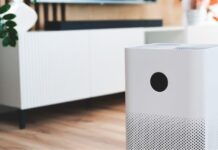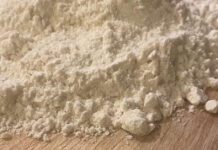As an allergy sufferer, you may be torn between using an air purifier vs humidifier for allergies. Each device can provide some form of allergy relief, though they both serve different purposes. In this article I compare the benefits of both. I also provide insight on which unit is better for different allergy symptoms.
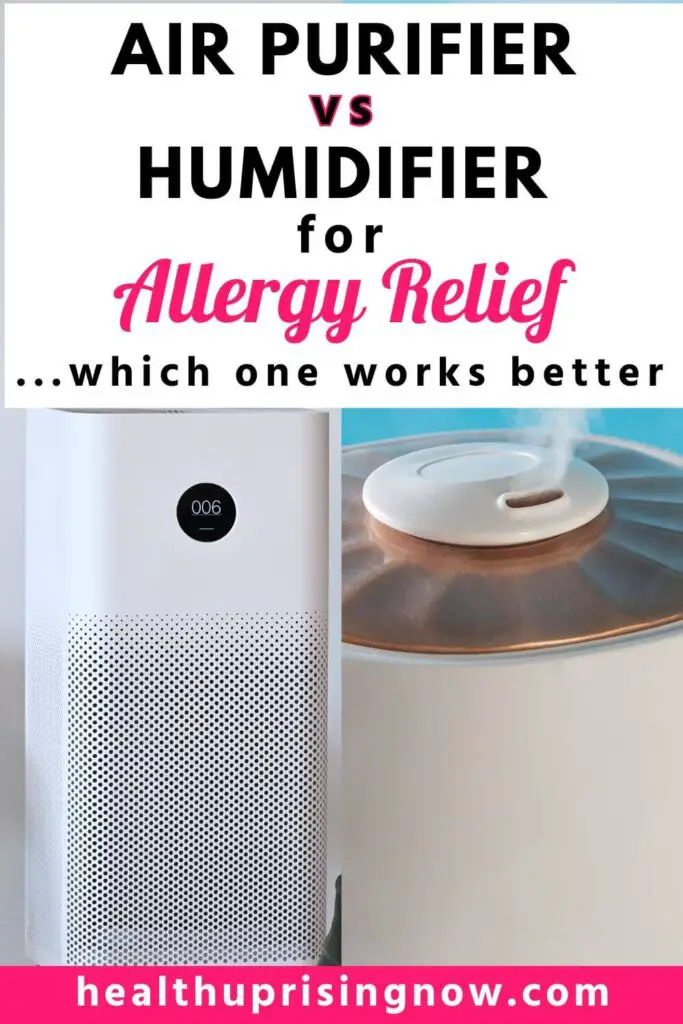
Table of Contents
Air Purifier vs Humidifier for Allergies
People with allergies can react to airborne particles and pollutants in the air. These airborne particles come from a variety of sources:
- Allergens like dust mites, pollen, mold spores and pet dander. These allergens can trigger asthma, eczema and allergic rhinitis.
- Airborne irritants like strong odors, pesticides, and house cleaning products can trigger allergy and asthma symptoms. .
- Particulate matter, including fine matter 2.5 micrometers in diameter, which is capable of penetrating deeply into the respiratory system. These airborne particles can cause health issues like asthma, decreased lung function, COPD and more. Particulate matter also includes course matter under 10 micrometers in diameter. Sources of particulate matter in the home can include burning candles, fireplaces, tobacco smoke and kerosene heaters.
People with allergies can also react to low humidity or dry air which is known to exacerbate allergy symptoms. Dust and pollen can remain in the air much longer under these conditions.
Irritated airways resulting from dry air are more reactive to allergens like pet dander, pollen and dust mites.
In my comparison of using an air purifier vs humidifier for allergies, I will look at how effective each is for allergies, asthma, and eczema. Known as the “atopic triad”, each condition is exacerbated by exposure to allergens and pollutants.
Indoor Air Quality
Air purifiers improve air quality by trapping or neutralizing airborne particles like pet dander, mold spores, and dust mites as well as harmful particles. These airborne contaminants are responsible for allergic reactions, asthma attacks and respiratory problems.
Depending on the type of air purifier, harmful chemicals, odors, gases and even bacteria and viruses can be removed. This will depend on the type of air purifier used as discussed later in this article.
Humidifiers, on the other hand, add moisture in the air. This alleviates dryness and respiratory discomfort.
Humidifiers have an indirect effect on airborne particles. Humidity causes particles to settle more quickly. However dust mites thrive in humid environments.
When moisture levels are too high it creates a breeding ground for mold. Humidifiers can also be a direct source of mold if they’re not adequately cleaned and maintained.
Allergy Symptoms
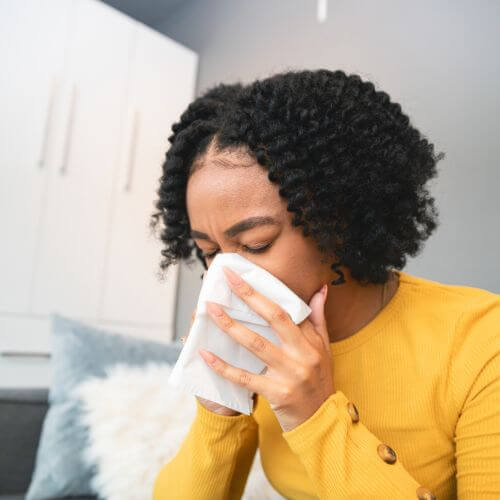

Air purifiers with a true HEPA filter can trap 99.97% of airborne particles, as small as 0.3 microns in diameter. Common allergens such as dust mites, pet dander, pollen, and mold spores fall in this category.
These particles are responsible for common allergy symptoms. Sneezing, runny or stuffy nose, postnasal drip, itchy or watery eyes and coughing can be reduced by using an air filter.
Humidifiers don’t remove harmful particles from the air. However, by increasing humidity levels they can help relieve allergy symptoms. This is especially important in the winter months.
Heating systems reduce the amount of moisture in the air. This can result in sinus issues, dry throat, sore throat, stuffy nose, runny nose, nasal congestion and dry cough.
Humidity levels between 40-50% are ideal for alleviating sinus inflammation.
Air purifiers are most effective for preventing allergy symptoms, while humidifiers are good to treat allergy symptoms.
You May Also Want to Read
Why Untreated Allergies May Increase the Risk of Developing An Autoimmune Disease
How to Transform Your Sleep Habits in 2024 With A Sleep Tracker Bullet Journal Printable
Asthma Symptoms


Air purifiers remove common allergens which can trigger asthma. They can also remove particulate matter resulting from fireplace use, burning candles or unvented space heaters, for example. Reducing the amount of airborne irritants can help minimize wheezing, coughing, and shortness of breath associated with asthma.
For some asthma sufferers, volatile organic compounds (VOC) can trigger asthma symptoms. Air fresheners, carpet and upholstery are common examples of VOCs. Using an air purifier with a carbon filter can help minimize exposure to VOCs.
Humidifiers can’t prevent asthma symptoms, but they can help treat them. Dry air can result in irritation of the airways which exacerbate asthma symptoms.
People with asthma often have increased mucus in their airways. This is a result of exposure to allergens like pollen, dust particles, mold and animal dander. Moist air from air humidifiers can help loosen mucus. This makes it easier to cough up.
Air purifiers are most effective for preventing asthma symptoms.
Eczema
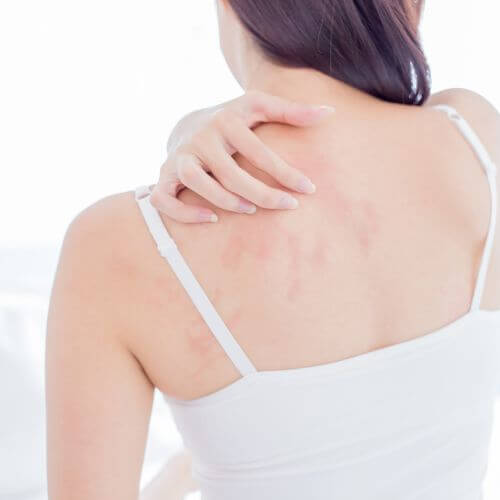

Eczema is a skin disorder characterized by dry, itchy, inflamed skin. Like allergies, eczema is associated with a heightened immune response to allergens.
Whether an air purifier can help relieve eczema symptoms depends on the triggers. Common culprits include dander, dust mites, pollen and mold.
Since air purifiers remove these indoor air pollutants, they can be helpful.
However, eczema triggers vary from person to person. Also, eczema can have multiple triggers. Some have nothing to do with air quality.
Eczema sufferers can benefit from using humidifiers. Eczema is a dry rash and low humidity levels can dry out skin even further. This worsens the itching and inflammation of eczema.
Eczema tends to flare more in winter months because cold air tends to be dryer. In addition, heating systems dry out skin.
Maintaining adequate humidity levels can help prevent or relieve eczema symptoms. This allows skin to heal faster, reducing the risk of infection.
In addition, eczema tends to compromise the skin barrier. This makes eczema sufferers more sensitive to allergens and irritants. Skin barrier functionality can be improved with adequate humidity levels.
Humidifiers are most effective at managing eczema symptoms.
Does it matter which air purifier you get?
There are many different types of air purifiers available for home use. Factors to consider when purchasing an air purifier include:
- How large or small the area you want to purify is.
- The types of contaminants that you’re looking to target.
- Noise levels.
- Ease of maintenance.
- Energy efficiency.
A portable air purifier is small enough to be carried from room to room. It can be placed on the floor, a table top or countertop and will filter the surrounding air. A whole-house air purifier is a more permanent solution. It’s connected to your home’s HVAC system.
There are several types of portable air purifiers. Below is a summary of each.
| HEPA Air Purifier | Activated Carbon Air Purifiers | Ionic Air Purifier | Ultraviolet (UV) Air Purifiers | |
|---|---|---|---|---|
| How it works | Built-in fan pulls surrounding air into the unit. As air passes through the filter, airborne particles are filtered out. The air is then recirculated into the room. | While some UV air purifiers use a fan to draw in surrounding air, not all models do. As air passes through the unit, odors are trapped in the carbon filter through a process called absorption. | The ionic air purifier releases ions with a negative charge. These ions attach to airborne particles causing them to become heavy or charged. This causes them to settle onto surfaces. | As air pass through the unit, particles are exposed to a UV light that kills certain microorganisms such as mold, bacteria and viruses. |
| Contaminants | Captures particles like pollen, dust, pet dander and microorganisms. | Absorbs odors, gases and volatile organic compounds (VOCs). | Removes dust, pollen, mold, cigarette smoke and other odors, viruses and bacteria. | Neutralizes microorganisms such as mold spores, viruses, and bacteria using ultraviolet light. |
| Noise levels | Some models may require a powerful fan, as HEPA filters tend to restrict airflow. This can be noisier. | Varies by model. Fan noise, motor noise, design and quality are determining factors. | Tend to operate more quietly since it doesn’t use a fan. | Some models that don’t use fans tend to operate more quietly. However, noise level varies by model. |
| Maintenance | On average filters are changed every 6-12 months. | Typically replaced every 3 months. | Lower maintenance than other purifiers since there are no filters. Surface areas exposed to air purifier should be periodically cleaned to avoid accumulation of these particles that settle on these surfaces. | UV air purifiers require infrequent cleaning, about every 1-2 years depending on the model. |
| Pros | Most effective at removing allergens. | Most effective at removing VOCs and other odors. | Effictive at removing allergens and some viruses. Quiet operation. More energy efficient. Doesn’t require filters. | Low maintenance. No filter replacement costs. |
| Cons | Primarily limited to particles, not gases and odors. | Not as effective at absorbing larger particles such as dust and allergens. Carbon filters need to be replaced frequently. | Generates ozone, a gas, which can be harmful to lungs. | Not as effective capturing larger particles like dust and other allergens. More expensive than other air filters. |
Are all humidifiers the same?
There are several types of humidifiers available. The right choice for you will depend on various factors.
- Room size
- Humidity Level
- Noise Level
- Safety
- Ease of Maintenance
- Health Concerns
- Budget
- Water Quality
| Ultrasonic Humidifiers | Evaporative Humidifiers | Vaporizer Humidifiers | Warm Mist Humidifiers | |
|---|---|---|---|---|
| How it works | Uses a vibrating ceramic element to break water into fine droplets. The droplets are emitted into the air with a fan. Once in the air, the droplets evaporate. | Draws water from a reservoir into a wick or evaporative pad which is then evaporated with a built-in fan. | Uses an element to heat water to the boiling point. Bacteria and mold are killed during the boiling process. Warm water vapor is released as steam. | Uses an element to heat water. A warm water mist is produced from the heating process and is released into the air. |
| Safety | Since this is a cool mist humidifiers it’s safe for use around children. | Since this is a cool mist humidifiers it’s safe for use around children. | Risk of burns | While water isn’t heated to the boiling level, precaution is still advised. |
| Noise levels | Quiet | Slightly noisier than other types. | Tend to be quieter since they don’t use a fan. However this varies by model. | Tend to be quieter since they don’t use a fan. However this varies by model. |
| Maintenance | Comes with removable, washable components. Regular cleaning and descaling may be necessary. | Wick filter will need to be replaced periodically. Water reservoir needs to be cleaned regularly. | Regular cleaning of the reservoir and heating element is required. | Regular cleaning is important to prevent the growth of mold and other organisms. Cleaning of the reservoir and heating element is required. |
| Pros | Energy efficient. Quiet operation. | Since impurities and minerals are removed before the moisture is released, this results in cleaner air than an ultrasonic humidifier. More affordable. | The steam can help reduce the spread of germs by making airborne particles heavier, causing them to settle on surfaces. Can be used with inhalants, so they’re good for colds. | Relieves congestion and helps soothe respiratory discomfort. Good to use during cold and flu season. |
| Cons | Minerals from tap water can be dispersed into the air as a mist. Using distilled or reverse osmosis water is recommended. | Fan used to evaporate water can be noisier than ultrasonic humidifiers. | Risk of burns. Consumes more energy than coll mist humidifiers. | Uses more energy than other humidifiers. |
Summary
Whether to use an air purifier vs humidifier for allergies depends mainly on your allergy symptoms and triggers. For asthma and allergy symptoms triggered by pet dander, pollen and dust mites, a HEPA air purifier is best. Air purifiers with a carbon filter work well for those whose symptoms are triggered by VOCs. And eczema sufferers would benefit from using a humidifier to help retain skin moisture levels.



